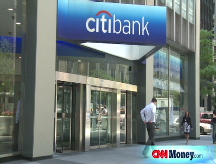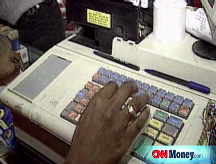Dollar edges higher
The greenback gains at the end of a week where oil fell $16 and financial institutions posted earnings that calmed investors spooked by IndyMac's failure.
NEW YORK (CNNMoney.com) -- The dollar gained slightly on a quiet Friday, as currency traders hope that oil stays at its current level below $130 and count their blessings that the earnings reports from financial institutions this week were not as bad as feared.
The euro bought $1.5843 Friday afternoon, down slightly from $1.5863 late Thursday. The greenback bought ¥106.95, higher from ¥106.28 late Thursday.
Oil prices fall nearly $16. The dollar has been supported by oil prices that fell sharply off their record highs this week. Oil fell $15.89 over the past three days as investors worried that high prices may have cut into demand, and reports showed surprise growth in oil, gasoline and natural gas supplies.
Because oil is traded in U.S. currency around the globe, record crude prices raise inflation concerns. Oil prices seesawed within a $4 range around the $130-per-barrel level on Friday, closing 41 cents lower at $128.88 a barrel. Investors were glad to see that the selloff in oil this week was not immediately erased by a quick rebound.
"It is positive for the dollar that crude oil has not managed to stage a recovery," said Stephen Malyon, currency strategist at Scotia Capital. "After the sharp dropoff in crude oil earlier in the week, there was a fear that there might be a sharp rebound."
Quarterly reports from banks. Better-than-expected financial results from financial institutions calmed investors who were sitting on edge after the IndyMac failure last Friday.
Citigroup (C, Fortune 500) reported a $2.5 billion loss on Friday, but investors were pleased to see that the bank still beat Wall Street's grim projections. "The U.S. dollar was a little bit stronger following the [results] from Citigroup, which were not as bad as expected," said Malyon.
JPMorgan Chase (JPM, Fortune 500) and Wells Fargo (WFC, Fortune 500) took hits during the quarter, but they also managed to stay ahead of Wall Street's expectations.
"It is a strange phenomenon where we see financial institutions reporting loses but, because it is less than expected, it is positively received," said Gareth Sylvester, senior currency strategist at HIFX in San Francisco.
Germany sees an uptick in inflation. An increase in producer prices in Germany prompted fears of inflation for the euro.
As Europe's largest economy, "Germany is an overall barometer for the euro zone," said Sylvester. "The euro zone is not overall a beacon of success or strength," added Sylvester, but "the weakness within the euro zone is being overshadowed by weakness in the U.S."
Germany may be a bellwether for the euro zone economy, but Malyon does not think the producer price data had much of an impact on the currency market on Friday.
"It is quite widely accepted that there are inflation concerns in Europe," said Malyon. While the euro did weaken a bit immediately following the release of the data from Germany early in the morning, Maylon says that if the markets were really concerned with the data, the euro would have moved more dramatically.
Inflation is generally a negative for a currency, but it is not always so simple, says Maylon. "It certainly is a sort of nuanced relationship and depends on regional concerns," he said.
"Because the European Central Bank has been as hawkish as it has, any inflation would raise concerns for a rate hike," said Maylon. "And I would expect that to have a beneficial impact on the market." ![]()




